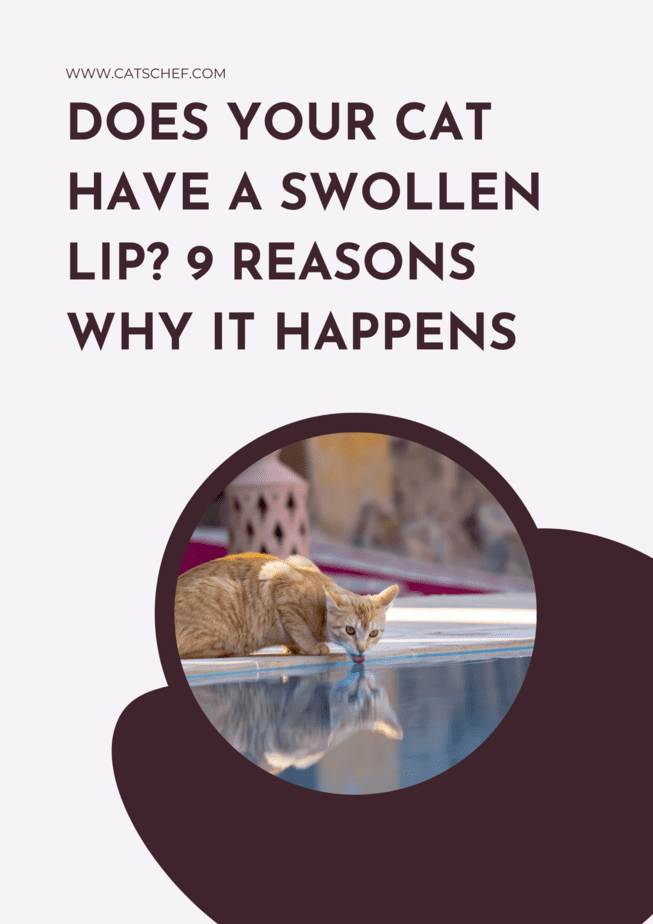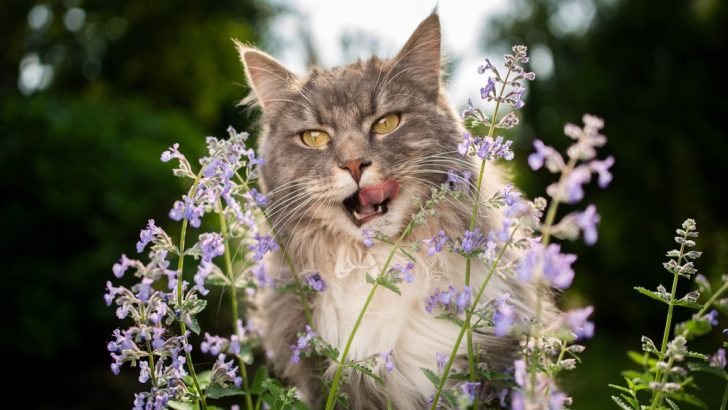It’s difficult to see any changes and abnormalities inside your kitty’s mouth, but you’ll easily notice that your cat has a swollen lip. After that, you’ll probably start freaking out as you have no idea what’s wrong with your pet.
First of all, take a deep breath and let me help you figure out what’s going on. Don’t start panicking right away as it can only make the matters worse.
So, did you know that the tissue around a cat’s mouth is one of the most sensitive parts of her body? It contains complicated structures that can help your feline navigate the world around her.
Hair, glands, the skin on her lips, her teeth and tongue are all located near and help her learn about her environment.
There are many things that can cause lip inflammation in cats. Some problems are more serious, while some are not that difficult to deal with.
Parasites, auto-immune disease, allergies, accidental injuries, dental problems, tumors, and toxins are some of the most common causes of why a cat can have a swollen lip.
Let me explain them to you, and tell you how to react when you notice the chance on your pet’s lips. It’s time for you to become a real feline expert, so let’s not wait any longer.
The most common symptoms of swollen lip in cats
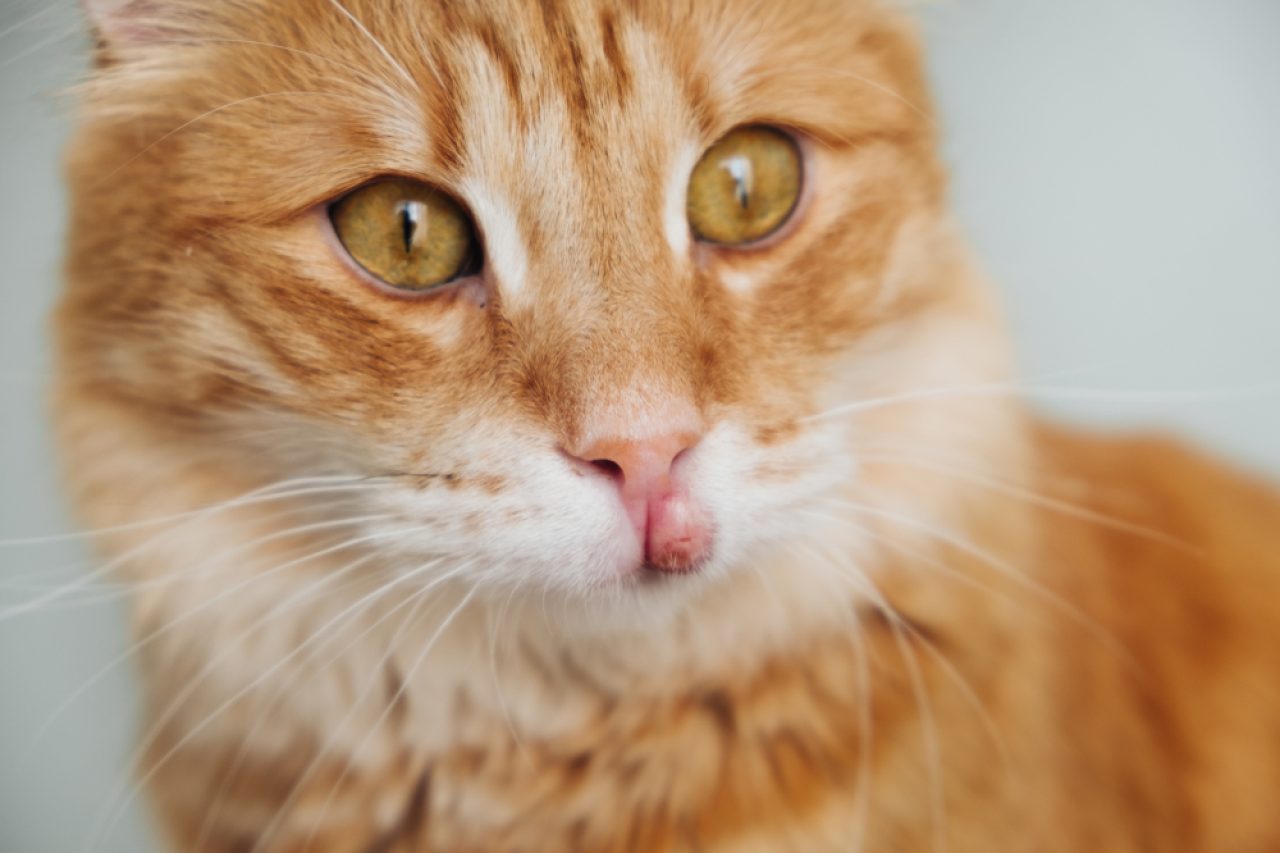
If you’re worried because your cat has a swollen lip, you then need to know which other symptoms she’ll likely show. I prepared a list for you, but keep in mind that sometimes they are pointing out a completely different problem. So it’s always best to consult with your vet before making any conclusions.
1) Her breath stinks
2) She has a swollen chin
3) Bleeding that starts without a reason
4) Her drinking routine changes
5) She has difficulties chewing
6) Your cat eats less
7) She’s dealing with dizziness
8) She starts drooling (more than usual)
9) She drops food from her mouth
10) You can see that her lymph nodes between the lower jaw and neck are getting bigger
11) She can’t swallow food easily
12) She shows signs of weakness
13) Constant gagging
14) Her gums and lips are very red, especially the lower part
15) Your cat deals with hair loss around her mouth
16) Her face and mouth are itchy so she keeps scratching them
17) She’s dealing with an ulcer or scab on the lip
18) She shakes her head uncontrollably
19) She loses weight
20) She’s moody more than usual
21) You noticed scabs on her face
22) She is constantly rubbing her face with paws or other objects
As I said, these symptoms usually point to various different health issues. If you notice that your cat is showing more than only a few of them, you should immediately contact your vet and consult with him about possible treatments.
Almost every problem can be solved if you contact a vet as soon as you notice the symptoms. You’ll sleep better knowing that you acted quickly and started treating the problem as quickly as possible.
Why does a cat have a swollen lip?
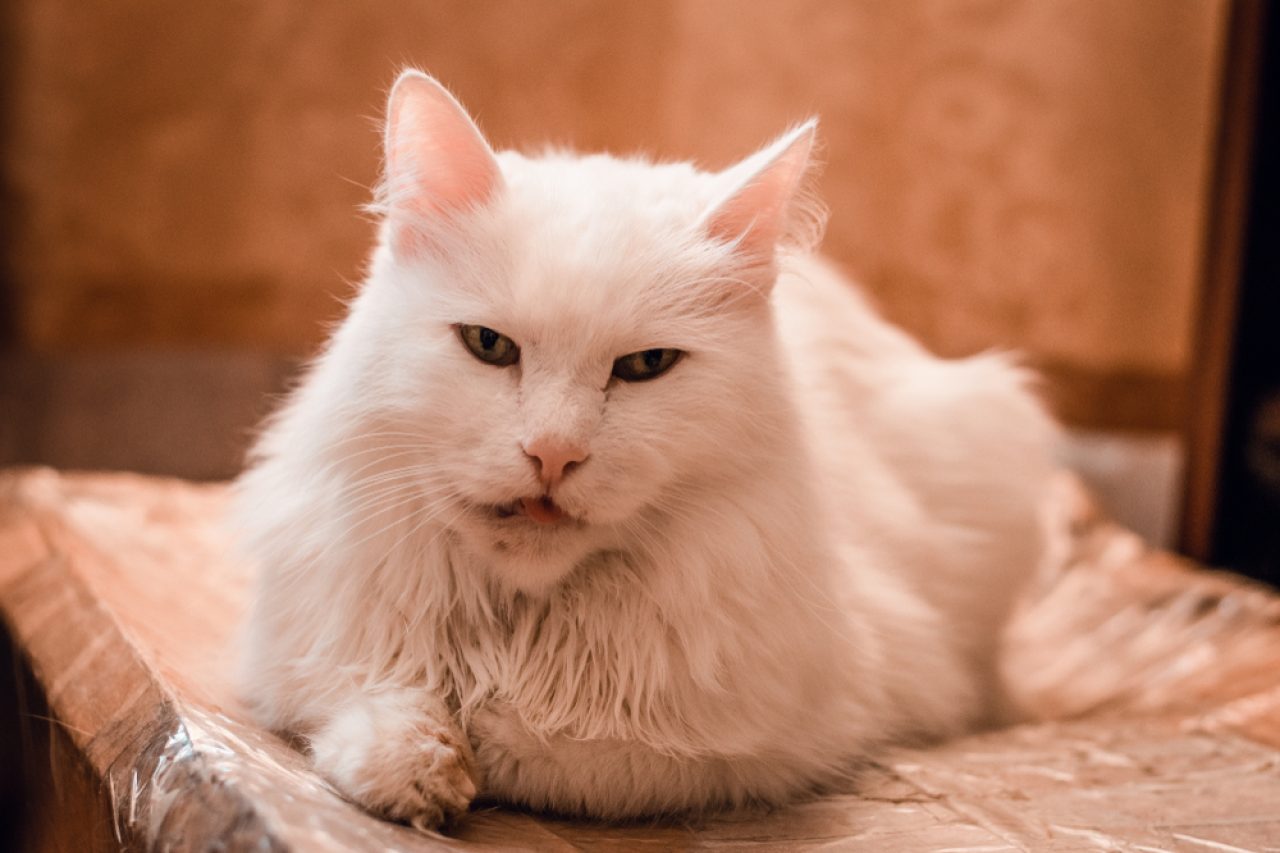
Do you remember when you were a kid and you accidentally hit or bit yourself and you got swelling? Your mom probably freaked out thinking that it could be some bigger problem behind that, even though you just had a little accident that doesn’t even hurt anymore.
However, it’s better to be safe than sorry, and our parents are the ones who taught us that when we were still those clumsy kids.
The same thing happens to us when we see something unusual on our cat. We panic, but that can actually be helpful. A cat can have a swollen lip for many different reasons. It could be something that’s not threatening her health, but it could also be a more serious problem that requires treatment.
That’s why it’s best we always have a vet on the quick dial. If you mention that you noticed swelling on your cat’s lip, the vet will most likely mention one of the following as possible causes.
1) Chin acne
Another name for the infected hair follicles on your cat’s chin is feline acne or chin acne. Many things depend on the location of that infection. If it’s close to the mouth, you can easily mistake it for swelling of the lips (upper or lower lip).
When it comes to cats and chins acne, it can have a variety of causes, including ingrown hairs and allergies. Chin acne, which may be more frequent in young cats than in other cats, can be treated by your veterinarian, who can easily determine what the problem is.
It is unlikely for them to cover the entire head, and your cat’s skin will get better after going through topical treatment.
2) Eosinophilic Granuloma Complex (EGC)
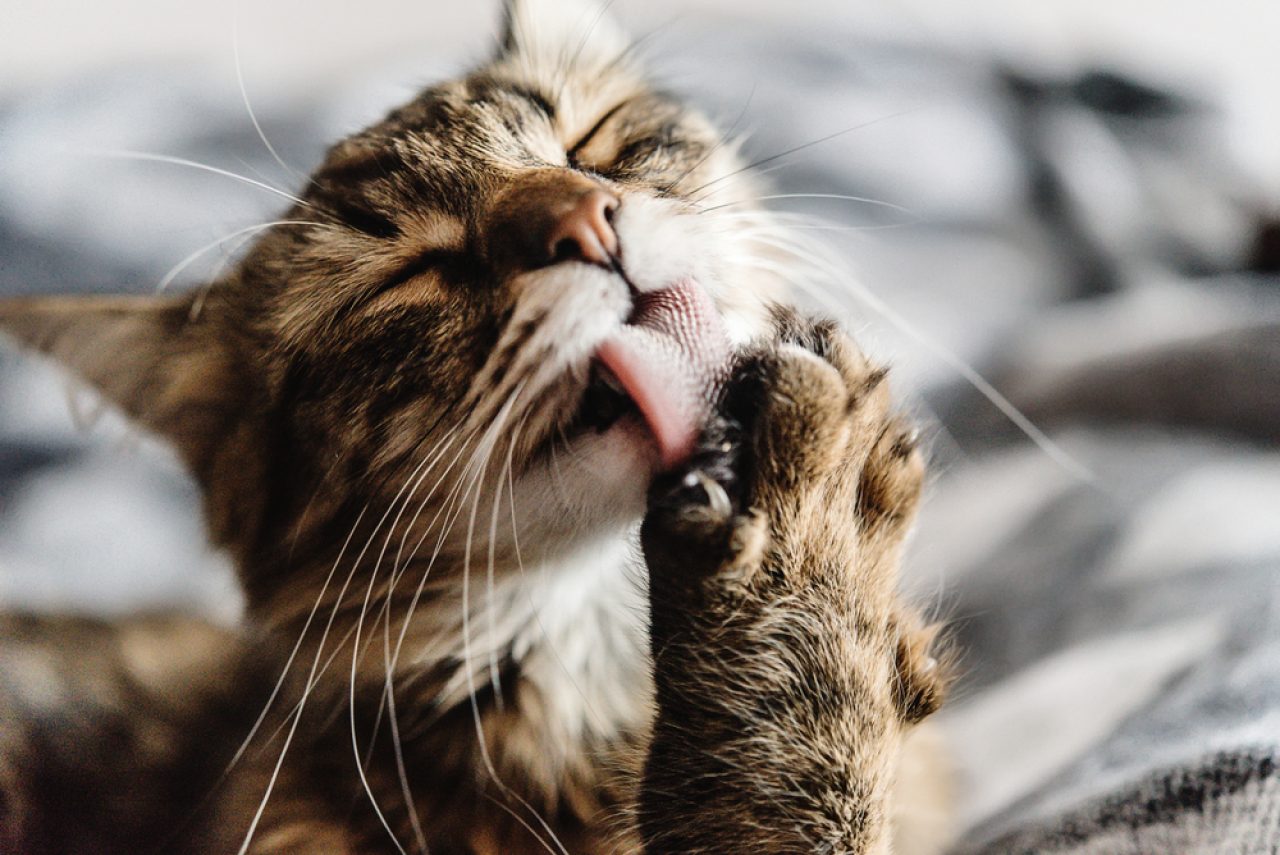
One of the most common things that can cause a swollen cat lip is an eosinophilic granuloma complex, which is also known as EGC. A puffy lip is one of the most obvious signs of EGC, however, a feline might also develop skin ulcers or inflammation on her feet, legs, and bellies.
This happens as a specific type of white blood cells triggers allergic responses. In order to fight back, these cells all gather at the affected area and then cause swelling. The most common causes for such an allergic reaction are:
1) Atopy (pollen)
2) Some kind of contact (especially with certain food)
3) Allergy to flea bite or hypersensitivity to mosquito bite
3) Infections
Lip and facial tissue can occasionally become infected with different kinds of skin infections. Cats that spend time outside are more likely to develop bacterial infections and abscesses caused by pathogens like Pasteurella and Staphylococcus.
Hair loss, red skin, and occasionally crusting are side effects of fungal infections such as ringworm. It’s not uncommon to see cats with ringworm infections that have caused crusty lips, noses, and ears.
If you suspect that your cat’s suffering from it, take her to the vet and ask him to perform a quick skin culture. That way, he’ll be able to come up with a diagnosis.
4) Different toxins
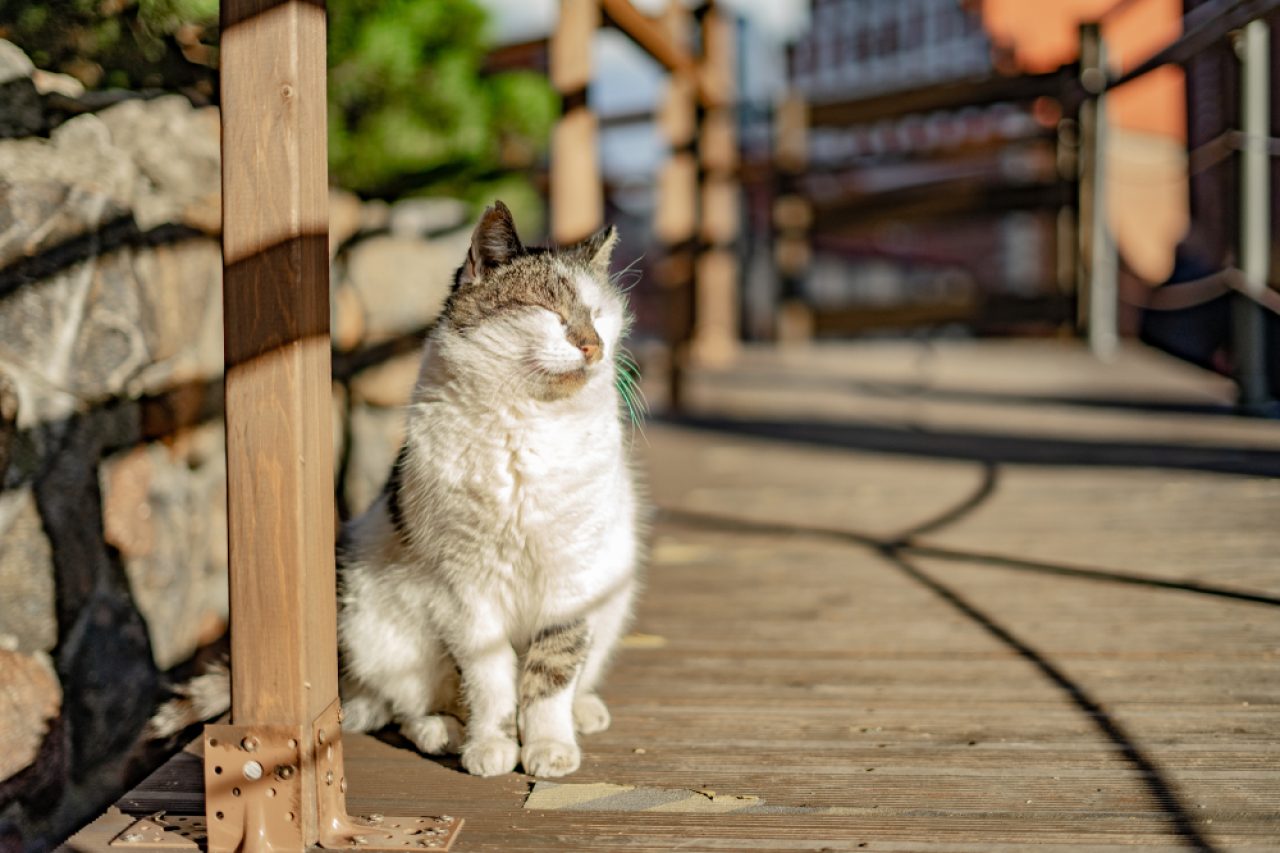
The Araceae family includes tropical indoor plants like Epipremnum and Scindapsus Pictus. If your pet decides to munch on the plant, don’t be surprised when you notice the swelling on her mouth or lips.
Avoid keeping Pothos and cats together in the same house. But if you’re both a cat and a plant person then make sure the plant is out of the cat’s reach.
In addition to this, pay close attention to your feline whenever you’re using essential oils in your household. Many of them are toxic for your pet and they might cause a swollen lip on your cat.
5) Dental disease
Teeth issues are very common when it comes to older cats and they get more severe over the years. There are many different kinds of oral issues, from mild gingivitis to stomatitis and tooth resorption. The inflammation can get so bad that it can cause lip swelling.
To be sure of what’s going on in your cat’s mouth, make sure to take her to a thorough oral examination. Intraoral radiographs are the only ways to definitively detect dental issues and even though they require anesthesia, you shouldn’t be afraid. In the end, your pet will thank you with a gentle “meow”.
Consult your veterinarian about your worries so that you can feel comfortable providing dental care for your cat. Keep in mind that it needs to be done to prevent more serious problems from occurring.
6) Demodex mites
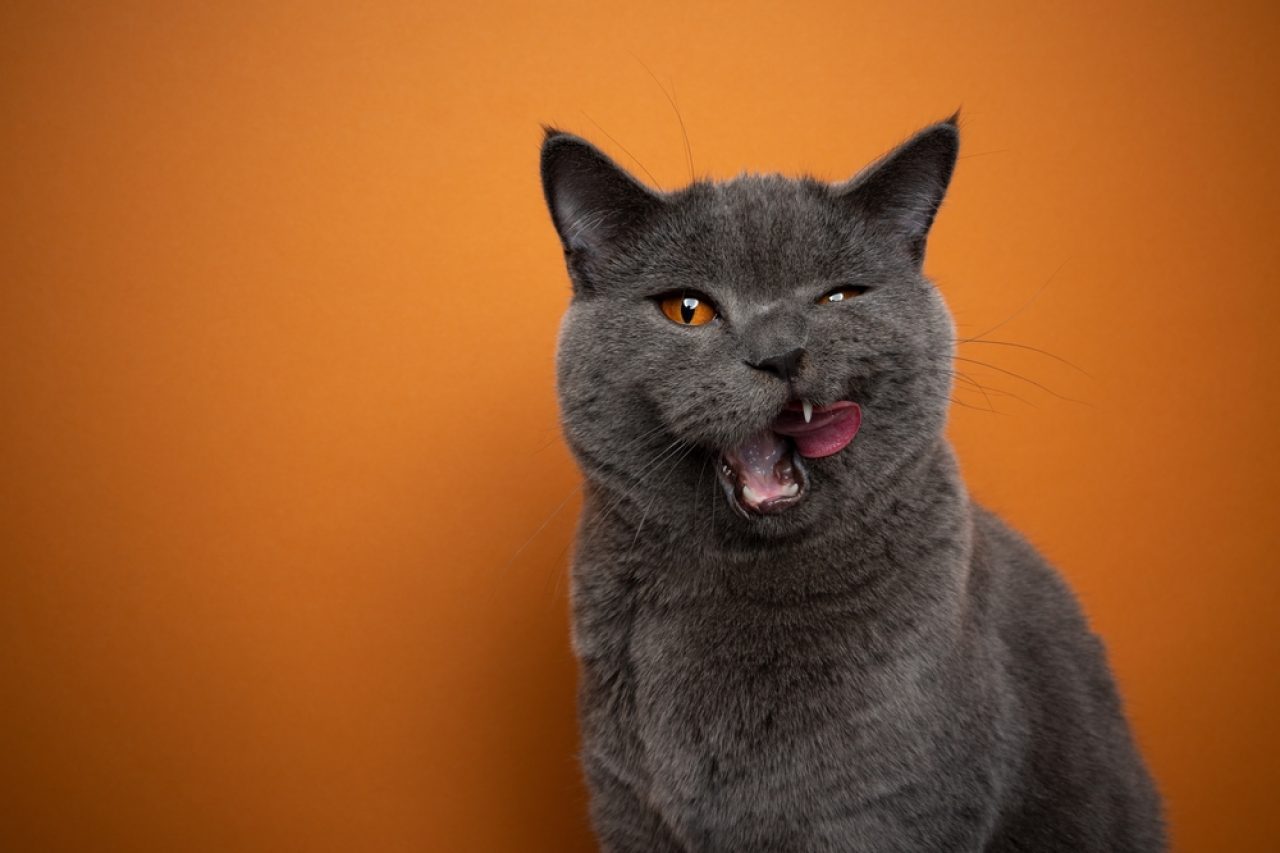
Demodex is a type of parasitic mite that inhabits the hair and skin follicles. It can be found on many different animal species, not just cats. There are three types of those parasitic mites that are common when it comes to cats: Demodex cati, Demodex gatoi, and one unspecified type.
Demodex mites are not necessarily problematic. In fact, many healthy cats may carry a few D. cati mites. Less frequently seen than D. cati mites, D. gatoi mites can transfer from cat to cat. Especially when two cats spend a lot of time together, cuddling, eating, fighting, sleeping, or even playing in the same areas.
Due to Demodicosis, it is common for cats to experience moderate swelling, hair loss, and small scabs. An infected cat may develop lesions on the body, head, ears, and even lips. If you see any of these symptoms, you should contact your vet as soon as possible.
7) Pemphigus
An immune-mediated condition called pemphigus destroys the connections between skin cells. Pustules, scabs, and swelling are just some of the signs I saw and I knew my cat is dealing with pemphigus. It can also affect the skin on the lips and other parts of the body, but thankfully it’s easy to notice.
The easiest way to identify pemphigus in cats is by a skin biopsy. Even though different pemphigus types respond differently to medical care, if you react as soon as you see some of the symptoms, your cat should have a big chance of a successful recovery process.
8) Oral tumors
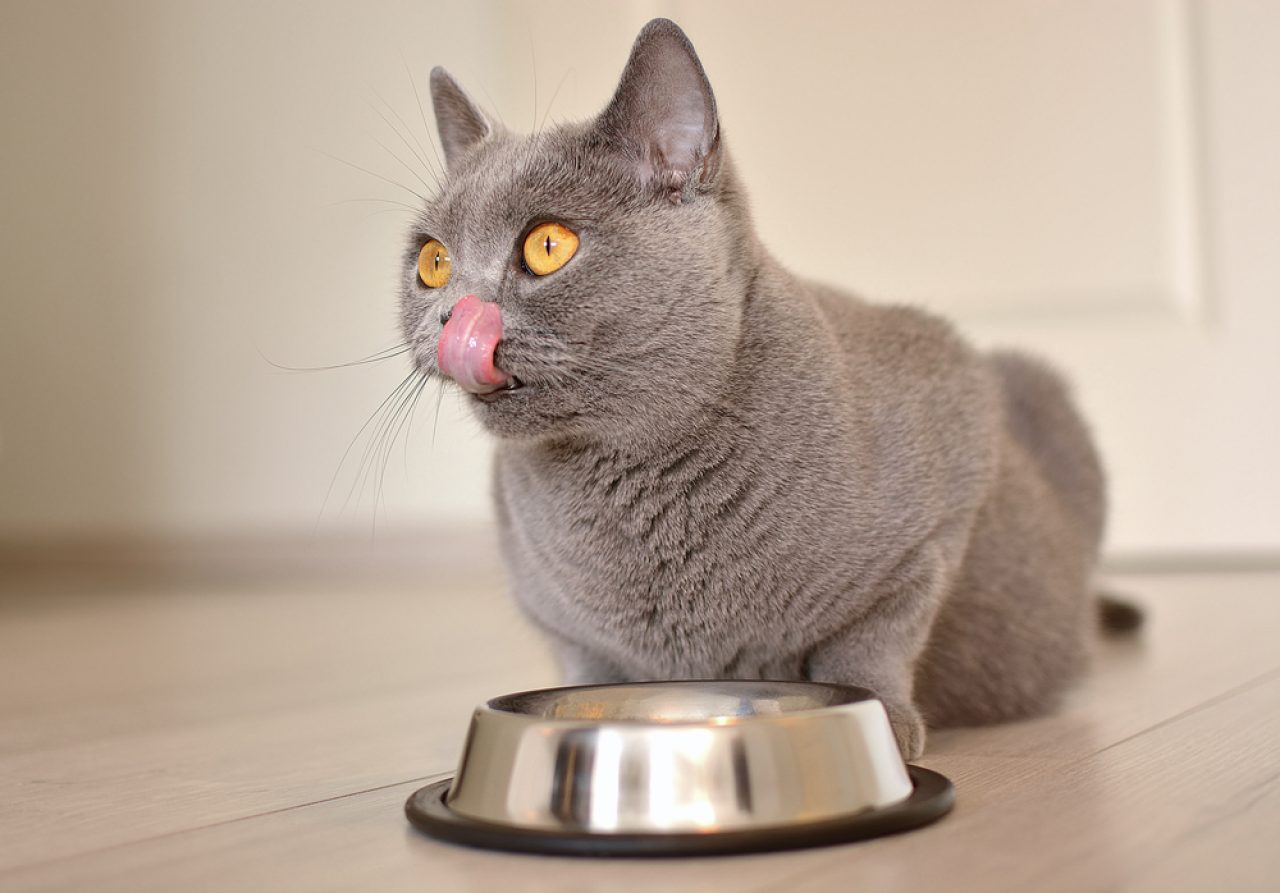
If your feline is dealing with an oral tumor, you’ll probably notice lots of lip swelling. It can be challenging to distinguish between benign and malignant tumors. However, with the help of a biopsy, a vet will always give the correct diagnosis.
If you contact your vet on time, you’re definitely helping your cat get more time and have bigger chances of recovery.
9) Skin tumor
It’s common that the area surrounding a cat’s mouth is where skin cancers first appear. However, many of the symptoms look similar to the ones that benign tumors have. The best method of diagnosis is again a biopsy.
It’s very important not to wait for a long time. React fast and start the treatment as soon as possible. That’s how your feline will have the biggest chance of winning the fight against this strong opponent.
What should I do if I notice my cat has a swollen lip?
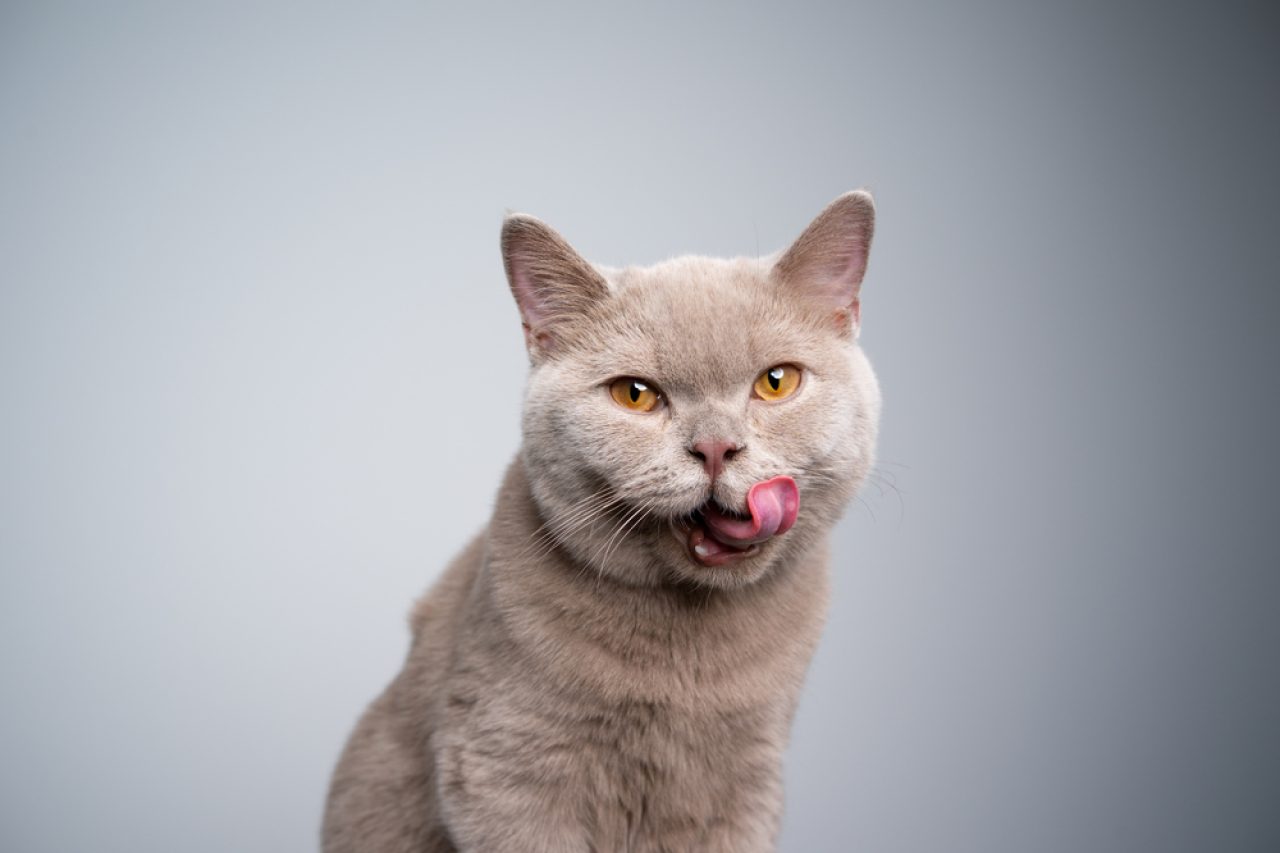
If your cat has swollen lips, the best advice I can give you is to call your veterinarian as soon as you can. The most important thing is to determine what caused your cat to get a swollen lip. It will help get the correct diagnosis on time and start the right treatment.
Swollen lips can be very painful for your kitty and very difficult to manage. So it’s crucial to react fast and have your vet check out your cat’s health and immune system. Sometimes the swelling will go away quickly, but if it doesn’t it can also be a sign that there’s something more going on.
Many people turn to different home remedies. But I wouldn’t recommend them because we’re talking about an unknown diagnosis and doing anything on our own can make more harm to your cat than good.
However, there are a few things that you can try at home. One of them is remembering all the symptoms you’ve noticed or giving your cat time (if you think swelling might be from a cut or knock). But if your cat’s lips don’t heal quickly, the best thing you could do is to bring your cat to the vet.
Getting the diagnosis
Getting the correct diagnosis is the most important step toward helping your cat heal. If your vet finds the right diagnosis on time, your cat’s recovery should be quick and successful. So you should do everything that is in your power to help him figure out what happened to your feline.
But how can you help? Before you go to the vet clinic, look around your house and try to figure out if there are any clues that could help the doctor figure out what’s wrong with your pet.
Those could be the essential oils you use (if you do), types of cleaning supplies, the food you give to your cat, new furniture, and so on.
You should also try to remember every behavioral change you’ve noticed so far. Loss of appetite, anxiety, excessive chewing or scratching, oversleeping, and anything else that your cat doesn’t usually do. Everything you say can be a step closer to getting the right diagnosis.
Before starting any treatments the vet will most likely do some tests. Here are the most common tests that help every veterinarian get the correct diagnosis:
1) Test on allergies
2) Bacterial culture
3) Biopsy
4) Blood tests
5) Food trial
6) Fungal culture
7) Medication trial
8) Radiographs
9) Skin crape
Possible treatments
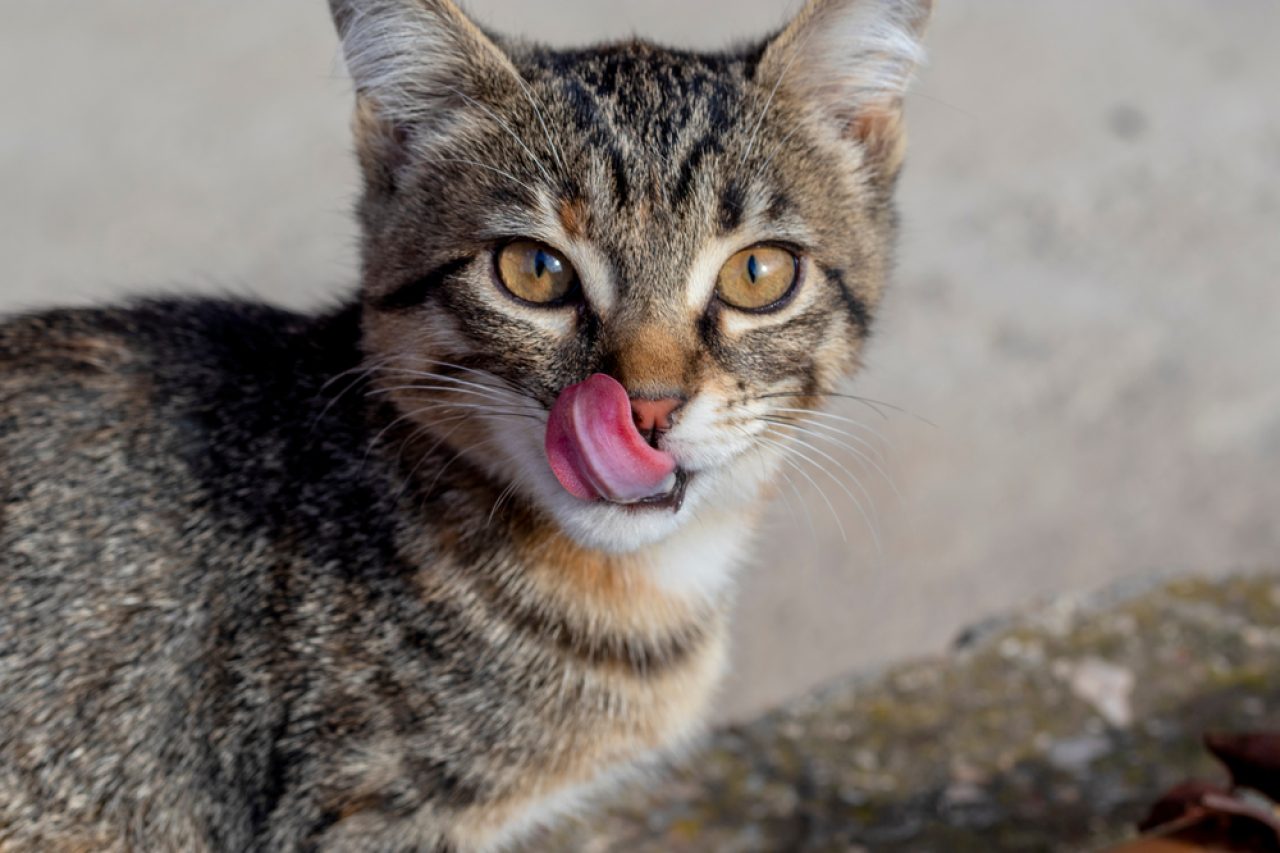
When the vet gets the correct diagnosis it will be time for him to find the right treatment for your cat and her swollen lip. Of course, every problem demands a different kind of treatment. Some of them last longer, some require a procedure, while others are shorter and much easier to deal with.
No matter how scary it seems, getting to the point of treatment is a good thing. It means you’ve acted on time and you’re doing everything you can to help your feline. To help you understand it better I prepared a brief summary of different ways of treating problems we’ve already talked about.
Allergy or EGC – The most common therapy includes steroids (oral or injectable). Another possible option is a food trial with hypoallergenic food.
Chin acne – it’s very similar to the way allergies are treated, but the vet will also add other necessary medicaments.
Dental infection – it’s important to clean all teeth, radiograph, and extract bruised teeth. The vet will probably add certain antibiotics as well.
Oral tumor – it’s treated by using radiographs, biopsy, surgical removal, or/and radiation treatment.
Final words
To sum everything up, there are many different things that can cause your cat to have a swollen lip. And depending on what the problem is your cat will get a different kind of treatment. I know that it’s scary but if you contact your vet as soon as you notice some of the symptoms, your feline should be fine.
Therefore, it’s important to act quickly and to search for professional help. That way, you and your cat, will both sleep better at night. She because the treatment will be helping her, and you because you’ll know that she’s doing better. So stay calm and keep your vet on the quick dial. Good luck!
